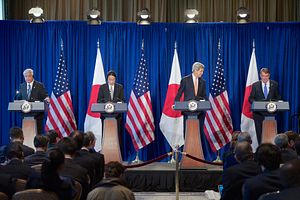Japan and the United States held a “two-plus-two” meeting on Monday in New York City between Japanese Foreign Minister Fumio Kishida and Defense Minister Gen Nakatani and U.S. Secretary of State John Kerry and Defense Secretary Ashton Carter. At the meeting, the two sides agreed to update the bilateral defense guidelines, as Ankit reported for The Diplomat’s Asia Defense blog.
In addition to coming to an agreement about the guidelines, the ministers discussed the plan for U.S. forces in Okinawa. Both sides affirmed that relocating the Futenma facilities from Ginowan to Henoko is the “only solution” for U.S. Marines stationed in Okinawa. Even though Kishida and Nakatani showed determination to go forward with the relocation, they asked for greater U.S. understanding to reduce the burden on Okinawa, through policies such as increasing transfers to Guam and returning Okinawan land to Japan.
However, no mention was made of Okinawan local politics — Okinawa, under Governor Takeshi Onaga, has become increasingly hostile toward the relocation. The U.S. side reciprocated Japanese overtures by showing willingness to cooperate with Japan, but did not mention any specific measures for reducing the burden on Okinawa.
At the joint press conference, Kerry promised the United States would defend Japanese territory, including the Senkaku Islands. President Barack Obama personally already made that promise when he visited Tokyo a year ago, when he explicitly said that the Senkakus are covered by the U.S.-Japan security treaty because they are administered by Japan. Still, such repeated expressions of commitment are reassuring to Japan, which is increasingly alarmed by Chinese bellicosity in the East China Sea.
In addition, both sides agreed that Japan and the United States are both interested in and concerned by the problems in the South China Sea because it is an important issue for the region’s peace and stability. Cooperating in the South China Sea is one issue area where Japan can do more to become a more equal partner with the United States within the alliance framework.
The emphasis of the alliance’s role in preventing unsettled maritime borders in East Asia from erupting into a major conflict is aptly summarized by the Nikkei Asian Review: “Making China think twice about projecting sea power forms an unstated aim of the first overhaul of Japan-U.S. defense cooperation in 18 years.”

































